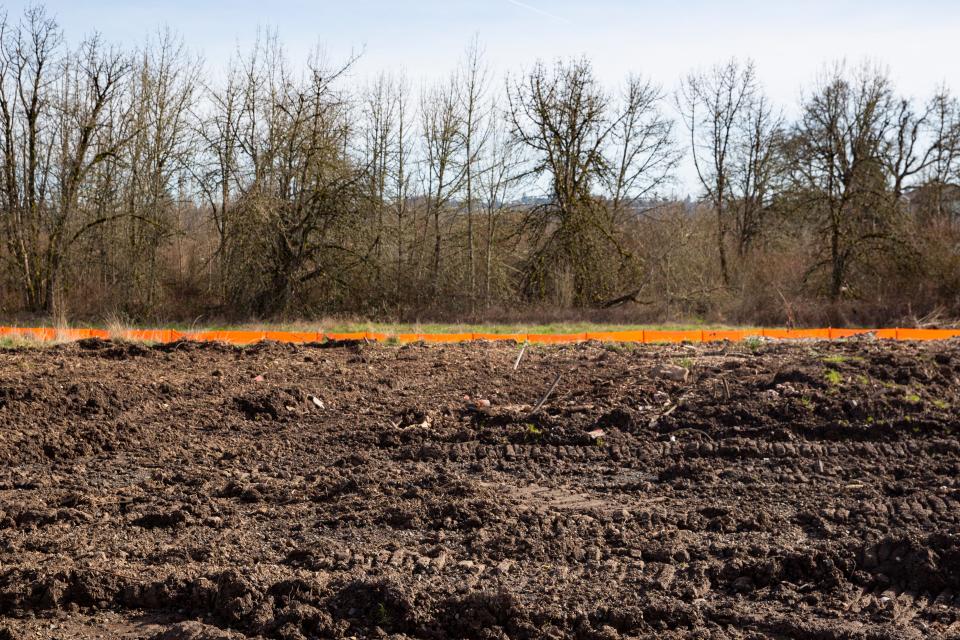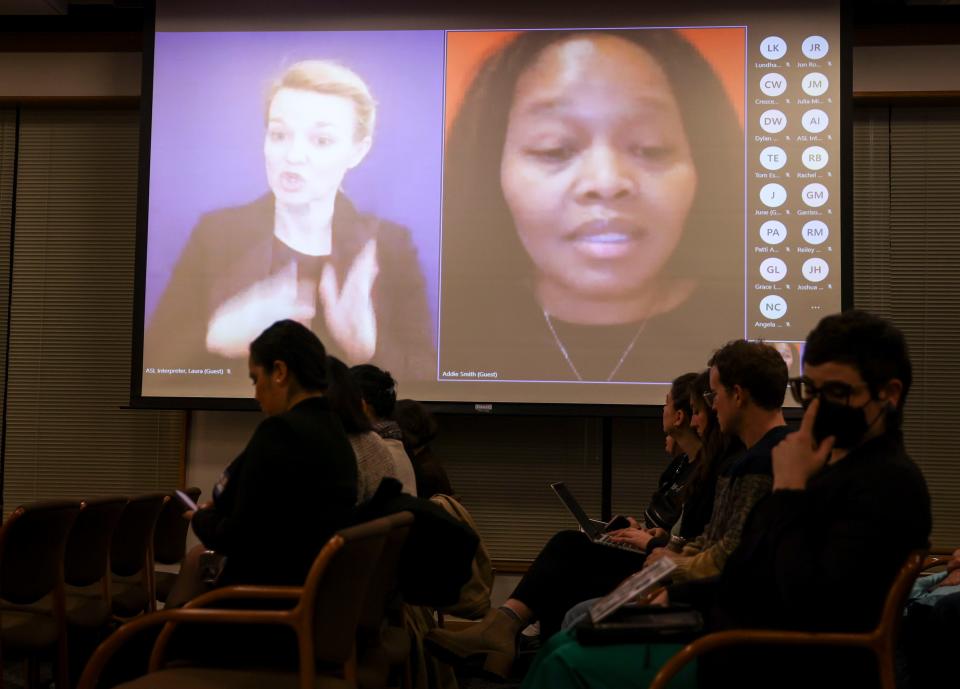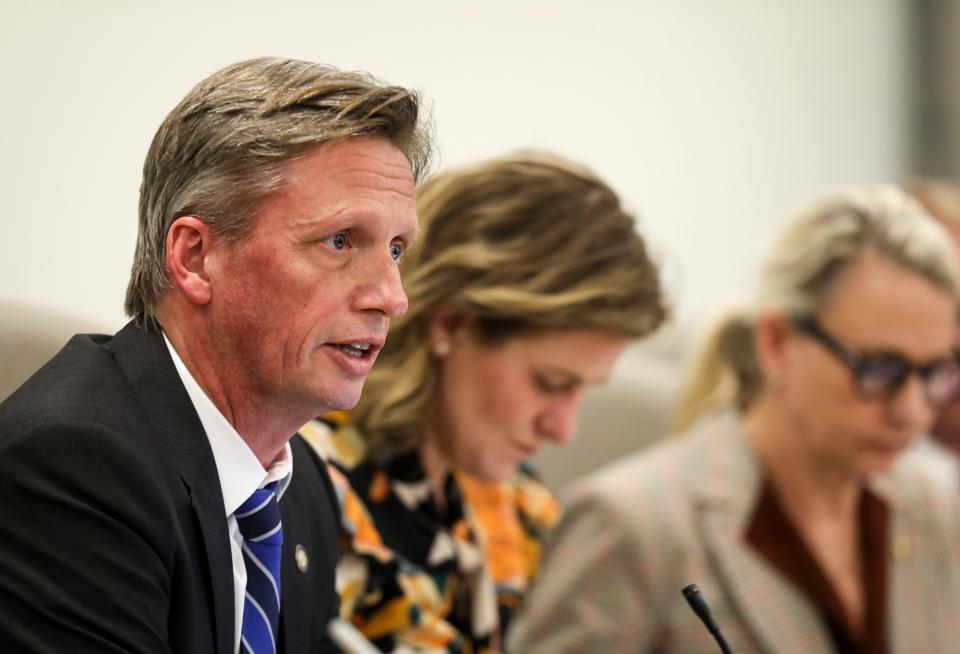Lawmakers revise proposal for drug penalties, Gov. Tina Kotek's housing production bill
- Oops!Something went wrong.Please try again later.
The 35-day legislative session is halfway over, and momentum is building on the key issues legislative leaders said would be their focus: housing and homelessness and Oregon’s drug crisis.
Lawmakers have until March 10 to pass policy bills and budget adjustments. Hearings on major legislation including rolling back the state's drug decriminalization law and bolstering housing production are expected this week.
The Oregon Senate last week passed legislation criminalizing drug use on public transportation. The bill now awaits a vote from the Oregon House. And on Friday, an amendment outlining a new agreement between Republicans and Democrats on penalties for drug possession was made public.

Gov. Tina Kotek's reduced housing ask in Ways and Means
Speaker Dan Rayfield told reporters on Thursday he expected bills around housing and homelessness to be moved out of the Ways and Means committee sometime this week, voted out of the committee and onto the Senate floor.
Senate Bill 1537 is Gov. Tina Kotek’s priority housing bill which she announced ahead of the legislative session.
The proposal would create a Housing Accountability and Production Office to support the production of new housing and allow for one-time expansion of cities’ urban growth boundaries.
Hundreds submitted testimony on the bill earlier this month.
Lawmakers moved the bill out of committee, but not without amending the number of acres cities could add to growth boundaries and cutting Kotek’s $500 million budget request to $350 million.
The proposal sent to Ways and Means would allow cities with more than 25,000 people to bring up to 100 acres into their urban growth boundaries if 30% of the development would go toward affordable housing and other requirements are met. Cities with populations under 25,000 would be able to bring up to 50 acres into their urban growth boundaries.
Kotek, through her spokesperson, said she had anticipated amendments to the bill, but hoped for “deeper investments” toward moderate-income financing and infrastructure programs.
“She hopes to see at least $200 million more than the legislature proposed dedicated to the bill,” Elisabeth Shepard, Kotek's press secretary, said in an email.
Kotek set a goal of building 36,000 housing units a year for the next 10 years to overcome Oregon’s housing crisis.

Agreement on policy around Oregon's addiction crisis
Action stalled the last two weeks on proposals to bring back penalties for drug possession as Democrats and Republicans negotiated.
Lawmakers held a public hearing Feb. 7 on House Bill 4002, the proposal supported by Democrats leading the Joint Committee on Addiction and Community Safety Response and Republicans' proposal, House Bill 4036, which would make changes to a key aspect of Measure 110, which voters passed three years ago.
Lawmakers now plan to host an additional public hearing this week on the 137-page amendment published Friday afternoon.
The now-revised bill would penalize drug possession as an entirely new misdemeanor with penalties of up to 180 days if diversion or deflection options fail.
The bill says "law enforcement agencies in this state are encouraged to, in lieu of citation or arrest, or after citation or arrest but before referral to the district attorney, refer a person to a deflection program. District attorneys are encouraged to divert for assessment, treatment and other services, instead of conviction."
Under the amendment, the Oregon Criminal Justice Commission would be required to establish a statewide system to track data around deflection program outcomes.
Rep. Jason Kropf, D-Bend, said lawmakers started the session with two overarching questions regarding the state's worsening addiction crisis: What are the immediate actions legislators can take to build out the state's treatment infrastructure and how do lawmakers continue with the long-term plan for the treatment infrastructure needed to make sure those in crisis get help.
"No one person has all the answers and that's why we tried to engage as many people as possible and I feel good about the package that we're putting together," Kropf said.

The amended proposal maintains investments in treatment while also giving law enforcement the tools they need, he said.
Diversion would still be possible in counties that opt-in.
As of Friday, 10 to 14 counties said they would partner with the state to create deflection programs in their communities, Kropf said. The programs are meant to offer those stopped for possession the opportunity to avoid the criminal process altogether and instead connect with treatment.
After successful completion of a deflection program, a law enforcement agency and district attorney would be required to seal all records within 60 days of receiving verification of completion.
Records would be expunged after two years from the date of a citation without any other prosecutorial action. Successful completion of probation leading to the dismissal of charges also would require expungement 90 days after the dismissal.
Records of individuals convicted of unlawful possession would be sealed three years after conviction.
"We're trying to create as many pathways and as many offramps towards treatment," Kropf said.
Other aspects of the bill remain unchanged including extending welfare holds from 48 hours to 72 hours, conducting a study specifically targeting barriers to youth's access to opioid use disorder treatment, and penalizing those dealing drugs within 500 feet of a treatment facility, shelter or public park.
Organizations who opposed the earlier version of the bill again expressed frustration and opposition as the amendment was released.
The ACLU of Oregon penned a letter to Kropf, Sen. Kate Lieber, D-Portland, Kotek and other leaders saying changes to HB 4002 were “functionally similar to the regressive” policies pushed by the group Fix and Improve Ballot Measure 110.
They also claimed stakeholders, including lawyers and civil rights advocates, were shut out of HB 4002 conversations.
“Oregon’s legislative leadership is digging a deep, unconscionable, and costly trench of human suffering by recriminalizing Oregonians experiencing drug addiction,” Sandy Chung, executive director of the ACLU of Oregon, said in a statement.
House Republican leader Rep. Jeff Helfrich, R-Hood River, said House Republicans have “stood strong alongside law enforcement and district attorneys to resolve the Measure 110 crisis” and would be reviewing revisions to ensure their goals were being met.
“Part of that solution absolutely must include recriminalizing drugs," said Helfrich.
Rep. Kevin Mannix, R-Salem, also has proposed a separate amendment to the bill which similarly creates a new drug misdemeanor. In a statement outlining his own 145 page proposal, Mannix said his plan takes necessary steps to "clean up our streets and get addicts help."
“Oregon is in crisis because of the failure of Measure 110. We need to put partisanship aside and focus on an Oregon solution – one based in policy, not politics," Mannix said.
A public hearing is scheduled for 5 p.m. on Monday.
Dianne Lugo covers the Oregon Legislature and equity issues. Reach her at dlugo@statesmanjournal.com or on Twitter @DianneLugo
This article originally appeared on Salem Statesman Journal: Lawmakers revise proposal for drug penalties, Gov. Kotek housing bill

